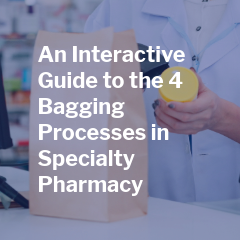
This visual helps illustrate the nuances of each type of bagging in specialty pharmacy and what it may mean for your health system.
With the growth of specialty pharmacy, having an experienced partner may be more important than ever.
By
Date
June 13, 2024

Read time: 3 minutes
By: Brad Myers
In an exclusive research report from McKesson Health Systems, just 19% of respondents – from a collective pool of 100 low, medium, and high-maturity health systems across the country – were found to have a plan in place to reduce the administrative burden associated with specialty pharmacy operations. Ranging from idle hours spent on prior authorization phone calls to the laborious work of navigating oft-complex manufacturer and payer requirements, and more, these time-consuming tasks can divert critical resources away from patient care and – in many cases – delay or even compromise a course of therapy.
Unequivocal challenges aside, more and more health systems recognize the indispensability of having an integrated specialty pharmacy both for improving patient outcomes and generating substantial revenue at a time its arguably needed most. This has – in part – led to exponential growth in the health system specialty pharmacy space over the last 5-10 years, according to Brad Myers, Vice President, Professional & Advisory Services, McKesson Health Systems, “[…] but,” he says, “successfully starting, maintaining, or expanding a health system specialty pharmacy doesn’t happen overnight – and it usually doesn’t happen alone.”
There are numerous factors to consider and barriers to solve for in operating a profitable and compliant health system specialty pharmacy, Myers goes on to explain, with one of those being administrative burdens, which – as our research report found – may be unaddressed in upwards of 80% of U.S. health systems. “Partnering with an experienced team of advisors provides health systems with the expertise and tools they need to identify mitigation and alleviation strategies that can help them gain access to limited distribution drugs (LDD), communicate more effectively and efficiently with manufacturers and payers, drive better medication adherence, and ultimately spend more time caring for their patients,” Myers suggests. Additional findings in the research report demonstrate health systems’ understanding of the benefit of such partnerships, with 86% of respondents acknowledging the role that external consulting can play in helping build and develop specialty pharmacies.
At McKesson, our Professional & Advisory Services (P&AS) team is comprised of a broad cross-section of experts in health system pharmacy that leverage a diverse set of skills, tools, solutions, and capabilities to help healthcare leaders zero in on their most important challenges and their greatest opportunities to improve the business of pharmacy.
Download the full Health Systems Specialty Pharmacy Research Report below for valuable industry insights, processes, and cost-saving strategies, and contact us today to learn more about how partnering with McKesson’s P&AS team can help your health system achieve more.